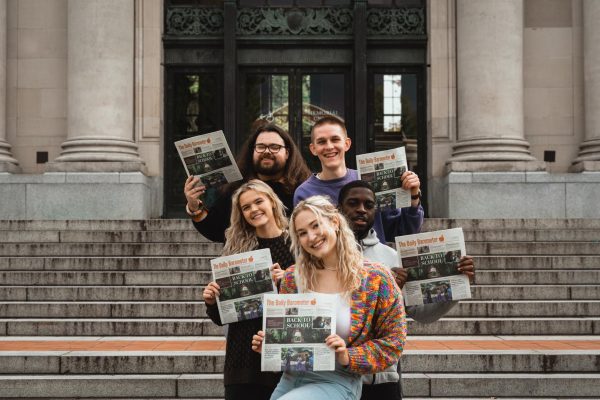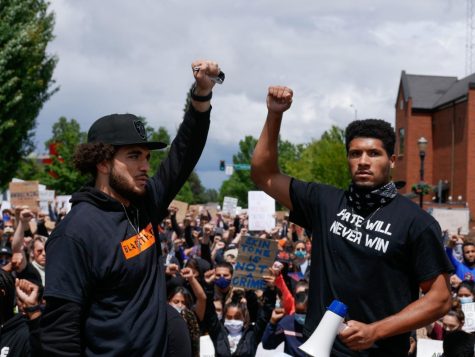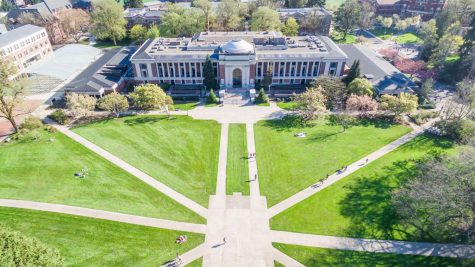U.S. government should not take bite out of Apple
February 23, 2016
Apple, Inc., arguably the most famous technology and cell phone company America boasts, has recently been the focus of the increasingly frustrated Federal Bureau of Investigation. The issue started when the FBI requested that Apple provide a “back door,” or unlocked entrance to Syed Rizwan Farook’s iPhone so that organization could collect evidence for its ongoing terrorist investigation against him. The Islamic extremist and his wife, Tashfeen Malik, were the two shooters in the horrific and bloody attack in San Bernadino, Calif. on Dec. 2, 2015, which resulted in the untimely deaths of 14 people.
Obviously, there are sound reasons that the FBI so desperately wants to know what kinds of information relevant to their investigation that might be lurking on Farook’s iPhone. The tragedy was huge in scale, and if there were other terrorist contacts on the phone, the FBI should have those as soon as possible, right?
You might be tempted to conclude that Apple should do whatever is necessary for the FBI to get their hands on the technology that could let them access it—it is, after all, an important piece of their investigation. However, the technology—which Apple hasn’t even created yet could have serious and sinister implications, were Apple to comply. Which Apple CEO Tim Cook has said on numerous occasions that he simply won’t do.
Cook recognizes that there is nothing except the FBI’s word to keep the government—and anyone who has the skills and technology to hack a system—from using this technology outside the scope of the San Bernardino terrorism investigation.
Think about that.
Essentially, that means that the government could reach its long, bony fingers into the inner workings of your iPhone, were it so inclined. Perhaps you think I’m being dramatic; that just because the government could do that doesn’t mean it would, and besides, you don’t have any incriminating evidence on your phone anyway because you are a model U.S. citizen.
Well that’s all fine and good, but in a country that values so dearly individual freedom and privacy, what the government is asking Apple to do is unfair.
The FBI isn’t going to give up easily. They do have a legal search warrant for the phone, but “the warrant is doing little good,” according to Fortune Magazine, because of course the phone is locked. So the FBI is suing Apple for the information, “citing a 1789 law called the ‘All Writs Act’ to force Apple to comply.” Basically, the writ allows the courts to force people to hand over information. However, the writ has exceptions that Apple will almost certainly be using to its advantage, such as the fact that Apple is too far removed from the investigation and that the court’s request puts an unfair burden on the company.
But much pressure the government presses on Apple, Apple pushes back with just as much force. On February 16, Apple wrote a letter to its customers, which can be found on its website. The letter, signed by Tim Cook, begins in huge font with “the United States government has demanded that Apple take an unprecedented step which threatens the security of our customers. We oppose this order, which has implications far beyond the legal case at hand.”
Ted Olson, Apple’s attorney in the case, said Sunday that to create a back door entrance to the iPhone “would spring open ‘Pandora’s Box,’ endangering the privacy of millions of Apple customers here and abroad,” according to the Los Angeles Times. He noted that if the government could force Apple to take this step, there would be no limit to what it could ask Apple and other technology companies to do.
On the other side of the argument, the director of the FBI, James Comey, is sounding more and more like a whiney child who hasn’t had his way and is clearly upset about it. “We simply want the chance […] to try to guess the terrorist’s pass code,” he said Sunday, according to the LA Times. “We don’t want to break anyone’s encryption.” However, unless you put your blind trust in the pinky promise of the U.S. government, these comments can be taken with the very smallest grain of salt.
We also have to remember that iPhones, though hugely popular in America, have been a sensation all over the world. So let’s say that Apple complies with the California court’s demands and creates an entrance to the iPhone. Perhaps the FBI doesn’t snoop around in your phone’s information. Congratulations. But what’s to stop an oppressive dictator elsewhere in the world from being able to access phones and subsequently stamp out free thought and any chance at a rebellion?
Or to stop hackers from stopping by and taking your sensitive information?
The possibilities are endless and really, really scary.
The FBI and other law enforcement agencies are beyond frustrated at all of the potential information that is at their fingertips but inaccessible because of a pass code. I can imagine how infuriating that would be. But would the technology really be used for just this case? Would they finally be able to get their hands on what they wanted and then be able to give Tim Cook a thank-you hug and walk away? I’d bet a lot of money on “no.” They would be using the back door for countless cases, and accessing the private information of countless citizens.
That’s why I applaud Apple for standing its ground. The case is long from over; whichever side wins this initial case will probably appeal, so the case could very likely see the supreme court, writes LA Times reporter Christopher Goffard.
Ultimately, this is not even about the San Bernadino case. What the FBI is demanding, Cook wrote to his millions of customers, “would undermine the very freedoms and liberty our government is meant to protect.” It’s important to remember what the purpose of the government is. When the government oversteps its bounds, it’s the right of the people to keep it in line.
The opinions expressed in Keating’s column do not necessarily represent those of The Daily Barometer staff.























































































































